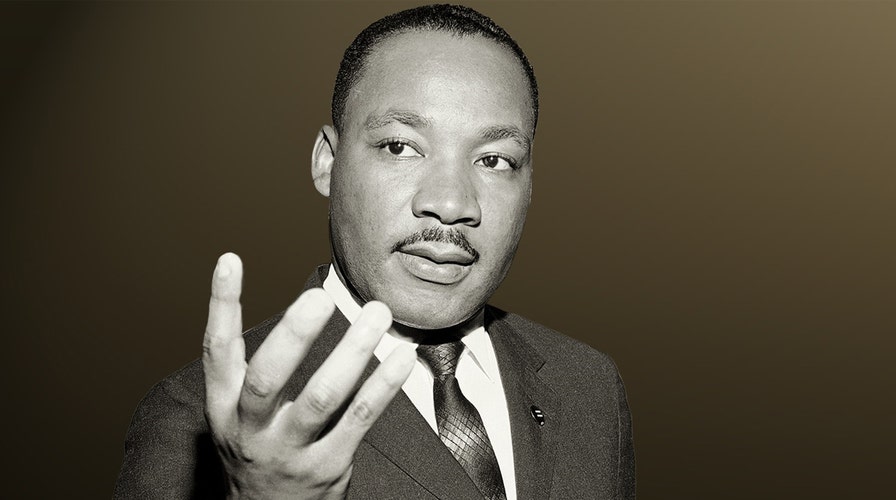The civil rights hero Martin Luther King Jr. famously pursued equality through peaceful protest, but many 21st century activists have said they want to "reclaim" him under a different image: as a forceful "radical."
MISSISSIPPI MAYOR HOPES TO HONOR MARTIN LUTHER KING JR 'RIGHT WAY' AFTER CONTROVERSY
The Chicago branch of Black Lives Matter pushed the #ReclaimMLK hashtag on Twitter, claiming Martin Luther King Day would allow activists to "engage about the real radical King they don't want you to know about!"
"We do King a disservice when we try to tell a flat story of turning the other cheek," said 31-year-old Charlene Carruthers, national director of the Black Youth Project 100 in Chicago. "It was never simply that."
OPINION: CAL THOMAS ON 'BLACK AMERICA SINCE MLK'
King's niece, the activist, author and Fox News contributor Alveda King, said protesters should not push his civil disobedience successes into the background. "Let's discuss racism from a peace with justice perspective," she tweeted ahead of Martin Luther King Day.
Younger black activists say they prefer the pointed, more forceful King to the Nobel Prize-winning pacifist who preached love over hate while leading nonviolent marches across the segregated South. They say they appreciate how the urgency exhibited in King's demand for equality in the years just before his 1968 assassination is in keeping with the Black Lives Matter rallying cry.
"There is a Martin Luther King that is important to the resistance movement that we don't hear about," Abdul Aliy-Muhammad, the 33-year-old co-founder of the Black and Brown Workers Collective in Philadelphia, told The Associated Press. "We always hear about love and forgiveness. ... There was also a King who was radical."
As Carruthers sees it, "agitation" was the core of King's work. "Their agitation shows up differently than how our agitation shows up today. However, I think King's work and the work we do are part of the larger tradition of black radical resistance."
Several protests across the country, many of which targeted the actions of police, have sparked riots. King's response to such riots in 1967: "Returning violence for violence multiplies violence, adding deeper darkness to a night already devoid of stars."
Fifty years ago this month, King retreated to the Caribbean with his wife, Coretta, and a few friends to write his final book, "Where Do We Go From Here: Chaos or Community?" In the book, published in June 1967, King argued for racial equality for black Americans through the wholesale embrace of social and economic reform.
During the book's promotional tour, King spoke out against the Vietnam War and criticized U.S. leaders for allowing slum conditions to persist in the cities. "Everyone is worrying about the long hot summer with its threat of riots. We had a long cold winter when little was done about the conditions that create riots," King said in June 1967.
King fought to end public segregation and pushed for the right to vote. But he also advocated for a living wage and worked to close the employment gap for blacks and spoke out against discrimination in policing -- to which rioting was a common response. King reacted to the Feb. 29, 1968, release of the report by the National Advisory Commission on Civil Disorders, also known as the Kerner Commission, by noting that the solutions suggested "have been made before almost to the last detail and have been ignored almost to the last detail."
It's a familiar climate for many in the Black Lives Matter movement who see their efforts in cities like Ferguson, Missouri; Chicago, Baltimore and Cleveland on a continuum that reaches back to King.
They identify with the fact that King was only 26 when he was thrust into a leadership role in the 1955 Montgomery Bus Boycott. When he died at 39 in 1968, before he could launch his Poor People's Campaign, King was still far younger than civil rights establishment figures such as A. Philip Randolph and Adam Clayton Powell.
Remembering King as a community organizer places his movement alongside contemporary activism, said Patrisse Cullors, co-founder of Black Lives Matter.
"He was really focused on poor black people," Cullors, 33, said. "Let's remember the King who was invested in changing the country that he loved so much, who called out elected officials who continued to endanger black people."
The Associated Press contributed to this report.






















